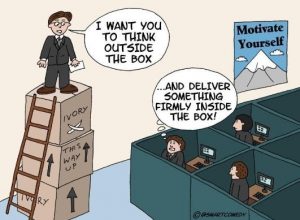
Trust is the foundation of any successful relationship, whether professionally or personally and when it’s broken, it is extremely hard to repair. I once had a supervisor if I was over one minute on my lunch time, she would send an email to remind me of my lunch hours, even though most of the time I never took my full lunch hour. I couldn’t even send an email without her approving it first. She was so inflexible that it was overbearing. I couldn’t trust her. When employees feel they can’t trust their boss, they feel unsafe, like no one has their back, and then spend more energy on survival than performing at their job.
The corporate world is littered with such micromanagers. Sadly many organizations prefer these managers because they seem to be on top of, and in control of everything. In the short term, they may produce results but in the long run they leave a trail of destruction in their path.
“It doesn’t make sense to hire smart people and then tell them what to to. We hire smart people so they can tell us what to do.” ― Steve Jobs
5 Damaging Effects of Micromanagement
1.Decreased Productivity – When a manager is constantly looking over their employees’ shoulders, it can lead to a lot of second-guessing and paranoia, and ultimately leads to dependent employees. Additionally, such managers spends a lot of time giving input and tweaking employee workflows, which can drastically slow down employee response time.
2. Reduced Innovation – When employees feel like their ideas are invalid or live in constant fear of criticism, it’s eventually going to take a toll on creativity. In cultures where risk-taking is punished, employees will not dare to take the initiative. Why think outside the box when your manager is only going to shoot down your ideas and tell you to do it their way?

3. Lower Morale – Employees want the feeling of autonomy. If employees cannot make decisions at all without their managers input, they will feel suffocated. Employees that are constantly made to feel they can’t do anything right may try harder for a while, but will eventually stop trying at all. The effects of this will be evident in falling employee engagement levels.
4. High Staff Turnover – Most people don’t take well to being micromanaged. When talented employees are micromanaged, they often do one thing; quit. No one likes to come to work every day and feel they are walking into a penitentiary with their every movement being monitored. “Please Micromanage Me” Said No Employee ever. I have never seen a happy staff under micromanagement.
5. Loss of Trust – Micromanagement will eventually lead to a massive breakdown of trust. It demotivates and demoralizes employees. Your staff will no longer see you as a manager, but a oppressor whose only job is to make their working experience miserable.
“Please Micromanage Me” Said No Employee, EVER.
Micromanagement is a complete waste of everybody’s time. It sucks the life out of employees, fosters anxiety and creates a high stress work environment. If you hired someone, it means you believe they are capable of doing the job, then trust them to get it done. A high level of trust between managers and employees defines the best workplaces and drives overall company performance. When you empower employees, you promote vested interest in the company. How can you empower others? Understand their strengths, support and utilize these strengths. An empowered workforce is more engaged. Engaged employees drive higher customer satisfaction and boost the bottom line. A Gallup study concluded that companies with higher-than-average employee engagement also had 27% higher profits, 50% higher sales and 50% higher customer loyalty.
Empowered employees are more confident, more willing to go the extra mile for employers, and more willing do whatever it takes to care for customers. In this volatile global marketplace, happy loyal employees are your biggest competitive advantage. If you want performance at scale: Select the right people, provide them with the proper training, tools and support, and then give them room to get the job done!
